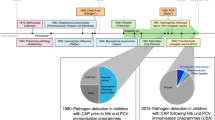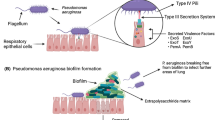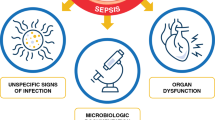Abstract
Prevention and management of opportunistic infections in children is particularly relevant in an era demonstrating an increased prevalence of immunocompromising conditions. The presence of an unusual organism which results in serious infection in a child should therefore always raise the consideration of immune compromise. The more common opportunistic infections have become easier to recognize in recent times due to improved awareness and more refined diagnostic testing. Targeted treatment is usually followed by long-term prophylactic medication. The impact of these conditions on patient outcome is of clear significance and certainly warrants further discussion.




Similar content being viewed by others
References
Algar V, Novelli V (2007) Infections in the immunocompromised host. Paediatr Child Health 17(4):132–136
Allen UD (2016) Management of infections in the immunocompromised child: general principles. LymphoSign J 3(3):87–98
Tulius M, Silva T, Grinsztejn B (2009) Opportunistic infections in the brain in developing countries. In: Paul RH et al. (eds) HIV and the brain, Current clinical neurology, pp 293–318
Bonilla FA, Geha RS (2003) Primary immunodeficiency diseases. J Allergy Clin Immunol 111:S571–S581
Chinen J, Shearer WT (2010) Secondary immunodeficiencies including HIV infection. J Allergy Clin Immunol 125(2):S195–S203
Corbett EL, Watt CJ, Walker N, Maher D, Williams BG, Raviglione MC, Dye C (2003) The growing burden of tuberculosis: global trends and interactions with the HIV epidemic. Arch Intern Med 163(9):1009–1021
Kumar V, Abbas AK, Fausto N, Aster JC (2010) In: Robbins and Cotran pathologic basis of disease, 8th edn. Saunders Elsevier, Philadelphia
Fieggen AG, Padayachy L (2015) Tuberculosis, parasitic and fungal infestations. In: Principles and practice of pediatric neurosurgery, 3rd edn. Thieme
Thwaites GE, Lan NT, Dung NH et al (2005) Effect of antituberculosis drug resistance on response to treatment and outcome in adults with tuberculous meningitis. J Infect Dis 192(1):79–88
Figaji AA, Fieggen AG (2010) The neurosurgical and acute care management of tuberculous meningitis: evidence and current practice. Tuberculosis 90:393–400
Lammie GA, Hewlett RH, Schoeman JF, Donald PR (2009) Tuberculous cerebrovascular disease: a review. J Inf Secur 59:156–166
Campbell IA, Bah-Sow O (2006) Pulmonary tuberculosis: diagnosis and treatment. BMJ 332(7551):1194–1197
Wait JW, Schoeman JF (2009) Behaviour profiles after tuberculous meningitis. J Trop Pediatr 56(3):166–171
Chang L, Cornford ME, Chiang FL, Ernst TM, Sun NC, Miller BL (1995) Radiologic-pathologic correlation. Cerebral toxoplasmosis and lymphoma in AIDS. Am J Neuroradiol 16(8):1653–1663
Andronikou S, Wieselthaler N, Smith B, Douis H, Fieggen AG, van Toorn R, Wilmshurst J (2005) Value of early follow-up CT in paediatric tuberculous meningitis. Pediatr Radiol 35:1092–1099
Idro R, Newton C (2005) Pathogenesis, clinical features, and neurological outcome of cerebral malaria. Lancet Neurol 4:827–840
Tandon V, Mahapatra AK (2011) Management of post-tubercular hydrocephalus. Childs Nerv Syst 27:1699–1707
Rajshekhar V (2009) Management of hydrocephalus in patients with tuberculous meningitis. Neurol India 57(4):368–374
Bullock MRR, van Dellen JR (1982) The role of cerebrospinal fluid shunting in tuberculous meningitis. Surg Neurol 18:274–277
Lamprecht D, Schoeman J, Donald P, Hartzenberg H (2001) Ventriculoperitoneal shunting in childhood tuberculous meningitis. Br J Neurosurg 15(2):119–125
Sil K, Chatterjee S (2008) Shunting in tuberculous meningitis: a neurosurgeon’s nightmare. Childs Nerv Syst 24(9):1029–1032
Palur R, Rajshekar V, Chandy MJ, Joseph T, Abraham J (1991) Shunt surgery for hydrocephalus in tuberculous meningitis: a long-tem follow-up study. J Neurosurg 74:64–69
Figaji AA, Fieggen AG (2013) Endoscopic challenges and applications in tuberculous meningitis. World Neurosurg 79(2):S24–Se9
Singh P, Kochhar R, Vashishta RK, Khandelwal N, Prabhakar S, Mohindra S, Singhi P (2006) Amoebic meningoencephalitis: spectrum of imaging findings. Am J Neuroradiol 27(6):1217–1221
Mathew JM, Rajshekar V, Chandy MJ (1998) Shunt surgery in poor grade patients with tuberculous meningitis and hydrocephalus: effects of response to external ventricular drainage and other variables on long-term outcome. J Neurol Neurosurg Psychiatry 65:115–118
Peltzer K, Naidoo P, Matseke G, Louw J, Mchunu G, Tutshana B (2012) Prevalence of psychological distress and associated factors in tuberculosis patients in public primary care clinics in South Africa. BMC Psychiatry 12(1):89
Jonathan A, Rajshekhar V (2005) Endoscopic third ventriculostomy for chronic hydrocephalus after tuberculous meningitis. Surg Neurol 63:32–35
Janku J (1923) Pathogenesa a pathologicka anatomie tak nazveneho vrozeneho kolobomu slute skvrny v oku normalne velikem a mikrophthalmickem s nalezem parazitu v sitnici. Cas Lek Cesk 60:1021.20
Grant A (1996) Varicella infection and toxoplasmosis in pregnancy. J Perinat Neonatal Nurs 10:17–29
Desmonts G, Couvreur J (1979) Congenital toxoplasmosis: a prospective study of the offspring of 54 women who acquired toxoplasmosis during pregnancy: pathophysiology of congenital disease. In: Thalhammer O, Baumgarten K, Pollak A (eds) Perinatal medicine. George Thieme, Stuttgart
Arnold SJ, Kinney MC, McCormick MS, Dummer S, Scott MA (1997) Disseminated toxoplasmosis. Unusual presentations in the immunocompromised host. Arch Pathol Lab Med 121(8):869–873
Conley FK, Jenkins HT, Remington JS (1981) Toxoplasma gondii infection of the central nervous system: use of peroxidise-antiperoxidase method to demonstrate toxoplasma in formalin fixed paraffin embedded tissue sections. Hum Pathol 12:690–698
Patel DV, Hofels E, Vogel N et al (1996) Resolution of intracerebral calcification in children with treated congenital toxoplasmosis. Radiology 199:433–440
Luft BJ, Conley F, Remington JS (1983) Outbreak of central nervous system toxoplasmosis in Western Europe and North America. Lancet 1:781–784
Diebler C, Dussler A, Dulac O (1985) Congenital toxoplasmosis: clinical and neuroradiological evaluation of the cerebral lesions. Neuroradiology 27:125–130
Remington JS, Mcleod R, Thuliez P et al (2006) Toxoplasmosis. In: Js R, Klein JO, Wilson CB et al (eds) Infectious diseases of the fetus and newborn, 6th edn. W.B. Saunders, Philadelphia, pp 947–1092
McCauley JB, Boyer KM, Remington JS, Mcleod RL (2009) Toxoplasmosis. In: Feigin RD, Cherry JD, Demmler-Harrison GJ, Kaplan SL (eds) Textbook of pediatric infectious diseases, 6th edn. WB Saunders, Philadelphia, pp 2954–2971
Desmonts G, Daffos F, Forrestier F et al (1985) Prenatal diagnosis of congenital toxoplasmosis. Lancet 1:500–504
Hohlfeld P, Daffos T, Costa JM et al (1994) Prenatal diagnosis of congenital toxoplasmosis with a polymerase-chain reaction test on amniotic fluid. N Engl J Med 331:695–699
Foulon W, Villena I, Stray-Pederson B et al (1999) Treatment of toxoplasmosis during pregnancy: a multicenter study of impact on fetal transmission and children’s sequelae at age 1 year. Am J Obstet Gynecol 180:410–415
Wilson CB, Remington JS, Stagno S, Reynolds DW (1980) Development of adverse sequelae in children born with subclinical congenital toxoplasma infection. Pediatrics 66:767–774
Roizen N, Swisher CN, Stein M, Hopkins J, Boyer KM, Holfels E, Mets MB, Stein L, Patel D, Meier P (1995) Neurologic and developmental outcome in treated congenital toxoplasmosis. Pediatrics 95:11–20
Mitchell CD, Erlich SS, Mastrucci MT, Hutto SC et al (1990) Congenital toxoplasmosis occurring in infants perinatally infected with human immunodeficiency virus 1. Pediatr Infect Dis J 9:512–518
Martinovic J, Sibalic D, Djordjevic M et al (1982) Frequency of toxoplasmosis in the appearance of congenital hydrocephalus. J Neurosurg 56:830–834
Stahl W, Kaneda Y (1997) Pathogenesis of murine toxoplasmic hydrocephalus. Parasitology 114:219–229
Porter SB, Sende MA (1992) Toxoplasmosis of the central nervous system in the acquired immunodeficiency syndrome.1992;327:1643–8
Holliman RE (1988) Toxoplasmosis and the acquired immune deficiency syndrome. J Inf Secur 16:121–128
Townsend JJ, Wolinsky JS, Baringer JR, Johnson PC (1975) Acquired toxoplasmosis. A neglected cause of treatable nervous system disease. Arch Neurol 32:335–343
Arendt G, von Giesen HJ, Hefter H, Neuen-Jacob E, Roick H, Jablonowski H (1999) Long-term course and outcome in AIDS patients with cerebral toxoplasmosis. Acta Neurol Scand 100:178–184
Walker M, Zunt JR (2005) Parasitic central nervous system infections in immunocompromised hosts. Clin Infect Dis 40(7):1005–1015
Mitchell WG (1999) Neurocysticercosis and acquired cerebral toxoplasmosis in children. Semin Pediatr Neurol 6:267–277
Medina MT, DeGiorgio C (2002) Introduction to neurocysticercosis: a worldwide epidemic. Neurosurg Focus 12(6)
Del Brutto OH, Santibanez R, Noboa CA et al (1992) Epilepsy due to neurocysticercosis: analysis of 203 patients. Neurology 42:389–392
Carpio A, Escobar A, Hauser WA (1998) Cysticercosis and epilepsy: a critical review. Epilepsia 39:1025–1040
Carpio A (2002) Neurocysticercosis: an update. Lancet Infect Dis 2:751–762
Cao W, van der Ploeg CPB, Xu J et al (1997) Risk factor for human cysticercosis morbidity: a population based case-control study. Epidemiol Infect 119:231–235
Sanchez AL, Lindback J, Schantz PM et al (1999) A population-based, case control study of Taenia solium taeniasis and cysicersosis. Ann Trop Med Parasitol 93(3):247–258
Schantz PM, Moore AC, Muńoz JL et al (1992) Neurocysticercosis in an orthodox Jewish community in New York City. NEJM 327:692–695
Pawlowski ZS (2002) Taenia solium: basic biology and transmission. In: Singh G, Prabhakar S (eds) Taenia solium cysticercosis. CABI Publishing, Wallingford, pp 1–23
Escobar A (1983) The pathology of neurocysticercosis. In: Palcios E, Rodriguez-Carbajal, Taveras JM (eds) Cysticercosis of the central nervous system. Charles C. Thomas, Springfield, pp 27–54
Sanz CR (1987) Host response in childhood neurocysticercosis: some pathological aspects. Childs Nerv Syst 3(4):206–207
Carpio A, Placencia M, Santillán F, Escobar A (1994) Proposal for a new classification of neurocysticercosis. Can J Neurol Sci 21:43–47
Estanol B, Corona T, Abad P (1986) A prognostic classification of cerebral cysticercosis: therapeutic implications. J Neurol Neurosurg Psychiatry 49:1131–1134
Pitella JEH (1997) Neurocysticercosis. Brain Pathol 7:681–693
White AC (2000) Neurocysticercosis. Curr Treat Options Infect Dis 2:78–87
Del Brutto OH, Rajshekhar V, White AC et al (2001) Proposed diagnostic criteria for neurocysticercosis. Neurology 57:177–183
Schantz PM, Wilkins PP, Tsang VCW (1998) Immigrants, imaging, and immunoblots: the emergence of neurocysticercosis as a significant public health problem. In: Scheld WM, Craig WA, Hughes JM (eds) Emerging infections. ASM Press, Washington DC, pp 213–242
Jena A, Sanchatee PC, Gupta RK et al (1998) Cysticercosis of the brain shown by magnetic resonance imaging. Clin Radiol 39:542–546
Sinha S, Sharma BS (2009) Neurocysticercosis: a review of current status and management. J Clin Neurosci 16:867–876
Rajshekhar V (2003) Solitary cerebral cysticercus granuloma. Epilepsia 44(Suppl):25–28
Bittencourt PRM, Costa AJ, Oliveira TV, Gracia CM, Gorz AM, Mazer S (1990) Clinical, radiological and cerebrospinal fluid presentation of neurocysticercosis: a prospective study. Arq Neuropsiquiatr 48:286–289
Tsang VW, Brand JA, Boyer AE (1989) An enzyme-linked immunoelectrotransfer blot assay and glycoproteins antigens for diagnosing human cysticercosis (Taenia solium). J Infect Dis 174:1007–1009
St Geme JW III, Maldonado YA, Enzmann D et al (1993) Consensus: diagnosis and management of neurocysticercosis in children. Pediatr Infect Dis J 12:455–461
Garcia HH, Carlton A, Evans W, Nash TE et al (2002) Current consensus guidelines for treatment of neurocysticercosis. Clin Microbiol Rev 15(4):747–756
Takayanagui OM, Jardim E (1992) Therapy for neurocysticercosis. Comparison between albendazole and praziquantel. Arch Neurol 49:290–294
Sotelo J, Escobedo F, Panegos P (1988) Albendazole vs praziquantel therapy for neurocysticercosis. A controlled trial. Arch Neurol 45:532–534
Thornton CA, Houston S, Latif AS (1992) Neurocysticercosis and human immunodeficiency virus infection: a possible association. Arch Neurol 49:963–965
Woo E, Yu L, Huang CY (1988) Cerebral infarct precipitated by praziquantel in neurocysticercosis: a cautionary note. Trop Geogr Med 40:143–146
Kelly R, Duong DH, Locke GE (2002) Characteristics of ventricular shunt malfunctions among patients with neurocysticercosis. Neurosurgery 50:757–762
Husain M, Jha DK, Rastogi M, Husain N, Gupta RK (2007) Neuro-endoscopic management of intraventricular neurocysticercosis (NCC). Acta Neurochir 149:341–346
Anandh B, Mohanty A, Sampath S, Praharaj SS, Kolluri S (2001) Endoscopic approach to intraventricular cysticercal lesions. Minim Invasive Neurosurg 44:194–196
Cavalheiro S, Zymberg ST, Teixera PD, Da Silva MC (2004) Hydrocephalus in neurocysticercosis and other parasitic and infectious diseases. In: Cinalli G, Maixner WJ, Saint-Rose C (eds) Pediatric hydrocephalus, vol 17. Springer-Verlag, Milan, pp 1–14
Fowler M, Carter RF (1965) Acute pyogenic meningitis probably due to Acanthamoeba sp.: a preliminary report. BMJ:740–742
Anzil AP, Rao C, Wrzolek MA, Visvesvara GS, Sher JH, Kozlowski PB (1991) Amebic meningoencephalitis in a patient with AIDS caused by a newly recognised opportunistic pathogen, Leptomyxid ameba. Arch Pathol Lab Med 115:21–25
Harms G, Feldmeier H (2005) The impact of HIV infection on tropical diseases. Infect Dis Clin N Am 19(1):121–135
Phillips RE, Solomon T (1990) Cerebral malaria in children. Lancet 336:1355–1360
Greenwood BM (1997) The epidemiology of malaria. Ann Trop Med Parasitol 91:763–769
Satishchandra P, Mathew T, Gadre G, Nagarathna S, Chandramukhi A, Mahadevan A, Shankar SK (2007) Cryptococcal meningitis: clinical, diagnostic and therapeutic overviews. Neurol India 55:226–232
Bruckner DA, Kokkinos HM (2009) Classification of fungi. In: Feigin and Cherry’s textbook of pediatric infectious diseases, vol 2. Saunders, Elsevier, pp 2715–2736
Mohar A, Romo J, Salido F, Jessurun J, de León SP, Reyes E, Volkow P, Larraza O, Peredo MA, Cano C, Gomez G, Sepúlveda J, Mueller N (1992) The spectrum of clinical and pathological manifestation of AIDS in a consecutive series of autopsied patients in Mexico. AIDS 6(5):467–473
Perfect JR, Dismukes WE, Dromer F, Goldman DL, Graybill JR, Hamill RJ, Harrison TS, Larsen RA, Lortholary O, Nguyen MH, Pappas PG, Powderly WG, Singh N, Sobel JD, Sorrell TC (2010) Practice guidelines for the management of cryptococcal disease: 2010 update by the Infectious Diseases Society of America. Clin Infect Dis 50:291–322
Baddley JW, Dismukes WE (2003) Cryptococcosis. In: Dismukes W, Pappas PG, Sobel JD (eds) Clinical mycology. Oxford University Press, New York, pp 188–205
Couppie P, Aznar C, Carme B et al (2006) American Histoplasmosis in developing countries with a special focus on patients with HIV: diagnosis, treatment, and prognosis. Curr Opin Infect Dis 19(5):443–449
Ruhnke M, Grzegorz K, Otto K, Schwartz S (2007) CNS aspergillosis: recognition, diagnosis and management. CNS Drugs 21(8):659–676
Donabedian H, O’Donnell E, Olszzewski C et al (1994) Disseminated cutaneous and meningeal sporotrichosis in an AIDS patient. Diagn Microbiol Infect Dis 18(2):111–115
Williams P (2007) Coccidioidal meningitis. Ann N Y Acad Sci 1111:377–384
Potter M (2005) Strategies for managing systemic fungal infections and the place of itraconazole. J Antimicrob Chemother 56(Suppl 1):i49–i59
Emery VC (2001) Investigation of CMV disease in immunocompromised patients. J Clin Pathol 54:84–88
Reuter JD, Gomez DL, Wilson JH, van den Pol AN (2004) Systemic immune deficiency necessary for cytomegalovirus invasion of the mature brain. J Virol 78:1473–1487
Author information
Authors and Affiliations
Corresponding author
Ethics declarations
Conflict of interest
The authors have no conflict of interest to declare.
Rights and permissions
About this article
Cite this article
Padayachy, L.C., Graham Fieggen, A. Infections in the immunocompromised child. Childs Nerv Syst 34, 1989–1996 (2018). https://doi.org/10.1007/s00381-018-3893-8
Received:
Accepted:
Published:
Issue Date:
DOI: https://doi.org/10.1007/s00381-018-3893-8




